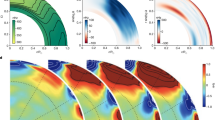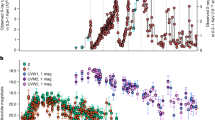Abstract
Neutron stars may support torsional oscillations, having periods in the lowest mode of a few tenths of a second, similar to the periods of the pulsed radio sources.
This is a preview of subscription content, access via your institution
Access options
Subscribe to this journal
Receive 51 print issues and online access
$199.00 per year
only $3.90 per issue
Buy this article
- Purchase on Springer Link
- Instant access to full article PDF
Prices may be subject to local taxes which are calculated during checkout
Similar content being viewed by others
References
Mestel, L., and Ruderman, M., Mon. Not. Roy. Astro. Soc., 136, 27 (1967).
Tsuruta, S., and Cameron, A., Canad. J. Phys., 44, 1836 (1966).
Bahcall, J. N., and Wolf, R. A., Phys. Rev., 140, B1452 (1965).
Finzi, A., Phys. Rev., 137, B472 (1965).
Meltzer, D., and Thorne, K., Ap. J., 145, 514 (1966).
Hewish, A., Bell, S., Pilkington, J., Scott, P., and Collins, R., Nature, 217, 709 (1968).
Wigner, E., Phys. Rev., 46, 1002 (1934).
Fuchs, K., Proc. Roy. Soc., 151, 585 (1935).
Clark, C., Phys. Rev., 109, 1133 (1958).
Lindemann, F., Phys. Z., 11, 609 (1910).
Pines, D., Elementary Excitations in Solids, Benjamin, New York (1963).
Brush, S., Sahlin, H., and Teller, E., J. Chem. Phys., 45, 2102 (1966).
Tsuruta, S., and Cameron, A., Canad. J. Phys., 43, 2056 (1965).
Harrison, B., Thorne, K., Wakano, M., and Wheeler, J., Gravitation Theory and Gravitational Collapse (University of Chicago, 1965).
Weiss, R., thesis, New York Univ. (1968).
Wolf, R., Ap. J., 145, 834 (1966).
Tsuruta, S., and Cameron, A., Canad. J. Phys., 44, 1895 (1966).
Abrikosov, A., and Khalatnikov, I., Reports on Progress in Physics XXII (The Physical Society, London, 1959).
Bardeen, J., Cooper, L., and Schrieffer, J., Phys. Rev., 108, 1175 (1957).
Kennedy, R., Willets, L., and Henley, E., Phys. Rev., 133, B1131 (1964).
Ginzburg, V., and Kirzhnita, Sov. Phys. JETP, 20, 1346 (1965).
Ruderman, M., Fifth Eastern Theoretical Physics Conference Proceedings, edit. by Feldman, D. (Benjamin, New York, 1967).
Androninkashvili, E., and Mamaladze, Yu, Progress in Low Temperature Physics, 5 (North-Holland, Amsterdam, 1967).
Author information
Authors and Affiliations
Rights and permissions
About this article
Cite this article
RUDERMAN, M. Crystallization and Torsional Oscillations of Superdense Stars. Nature 218, 1128–1129 (1968). https://doi.org/10.1038/2181128a0
Received:
Issue Date:
DOI: https://doi.org/10.1038/2181128a0
This article is cited by
-
Three-layered relativistic hybrid star with distinct equation of states
Indian Journal of Physics (2022)
-
Cosmic electromagnetic bomb sheds light on the origins of γ-ray bursts
Nature (2021)
-
Bursts of gravitational waves due to crustquake from pulsars
Journal of Astrophysics and Astronomy (2020)
Comments
By submitting a comment you agree to abide by our Terms and Community Guidelines. If you find something abusive or that does not comply with our terms or guidelines please flag it as inappropriate.



